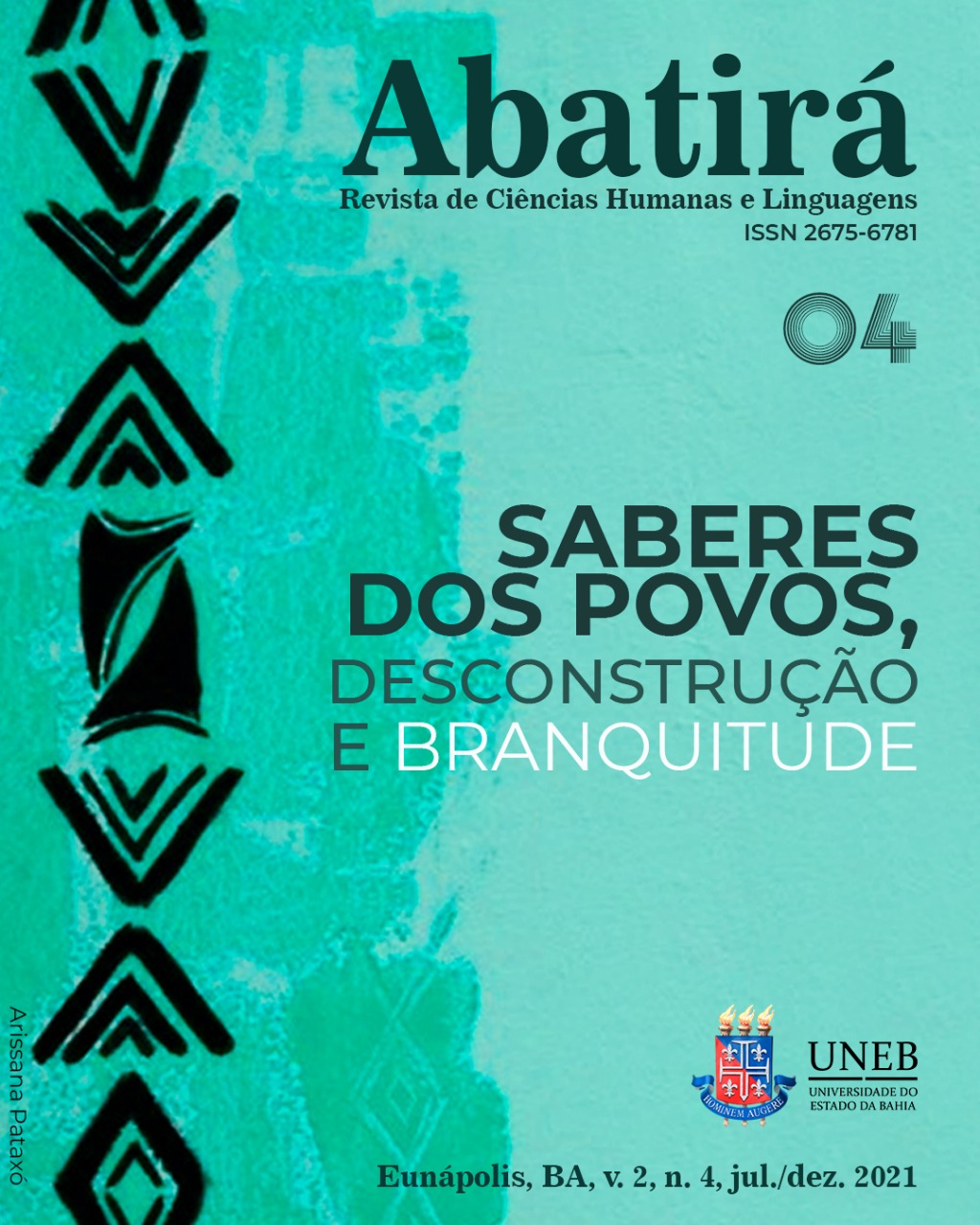Whiteness and its Expressions in the Career of Higher Teaching
Keywords:
Whiteness, Institutional Racism, Education, SubjectivityAbstract
This paper aims to broaden the discussion of the results of a Master’s in Education research on the reflexes of whiteness in Brazilian higher education, based on two central aspects: “the expression of whiteness in the career of higher education” and “white privilege”. Through a theoretical framework that discusses institutional racism in education in the light of critical studies of Brazilian and American whiteness, we seek to identify the racial integration process of the Federal University of Ouro Preto (UFOP) from 1969 (the institution’s founding year) to 2019, locating, in the under-representation of non-whites, the expression of whiteness in the institution, as well as in the process of implementing Law No. 12.711/14, which institutes the Vacancy Reserve for Blacks (RVN) in the federal civil service. The discussion opens the way for the analysis of aspects related to the racialization of subjectivity and the “privilege of race”, which were analyzed based on excerpts from an interview carried out with an effective teacher for 20 years at the institution. The results found reiterate the complexity of the theme and can become even more dense when included in decision spaces. This demonstrates that the objective understanding of racial inequalities in the university needs objective instruments to understand their effect, but these must go together, with a broad and transparent dialog, with the professors, favoring “racial self-awareness” and, therefore, enhancing institutional transformations.
Downloads
References
BENTO, Maria Aparecida da Silva. Notas sobre a expressão da branquitude nas instituições. In: BENTO, Maria Aparecida da Silva; SILVÉRIO, Marly de Jesus; NOGUEIRA, Simone Gibran (Orgs). Identidade, Branquitude e Negritude. Casa do Psicólogo, 2014, p. 13-33.
BRAZIL. Law 12.711, of August 29, 2012. Provides for admission into federal universities and federal technical and high school level federal education institutions and sets other measures. Brasília: Official Federal Government Press, 2012. 173.
BRAZIL. Law 12.990 of June 9, 2014. Reserves for blacks 20% (twenty percent) of enrollments offered in public servant contests for public jobs in the scope of the federal administration, agencies, public foundations, state-owned companies and Federal Government-controlled entities. Brasília: Official Federal Government Press, 2014.
CRENSHAW, Kimberlé. Documento para o encontro de especialistas em aspectos da discriminação racial relativos ao gênero. Rev. Estud. Fem., Florianópolis, v. 10, n. 1, p. 171-188, Jan. 2002.
DIANGELO, RobinJ. Não Basta Não Ser Racista: Sejamos Antirracistas. Robin Diangelo: Translation by Marcos Marcionilio – São Paulo: Faro Editorial, 1 Ed. 2020.192p
FAGUNDES, Isabela Perucci Esteves. Heteroidentificação racial para concursos públicos de professores/as na Universidade Federal de Ouro Preto - UFOP. [monograph] / Isabela Perucci Esteves Fagundes. – 2020, 183 page
JESUS, Rodrigo Ednilson. Autodeclaração e heteroidentificação racial no contexto das políticas de cotas: quem quer (pode) ser negro no Brasil? In: SANTOS, Juliana Silva; COLEN, Natália Silva; JESUS, Rodrigo Ednilson (Orgs). Duas décadas de políticas afirmativas na UFMG: debates, implementação e acompanhamento. Rio de Janeiro: UERJ, LPP, v.9 p.125-142. 2018.
GOMES, Nilma Lino. O Movimento Negro e a intelectualidade negra descolonizando os currículos. In: COSTA, Joaze Bernardino; TORRES, Nelson Maldonado; GROSFOGUEL, Ramón (Orgs). Decolonialidade e pensamento afrodiaspórico. 2ed Belo Horizonte. Autentica. 2019, p. 223-246.
GUIMARÃES, Antonio Sergio Alfredo. Racismo e Anti-Racismo no Brasil. Novos Estudos CEBRAP, 43, November 1995, p. 26-44.
LABORNE, Ana Amélia de Paula. Por essa porta estar fechada, outras tiveram que se abrir: identidade racial negra branquitude e trajetórias de docentes da educação superior. Belo Horizonte: Nandyala, 2014. 156p
LIMA, C. de A., & FREITAS, R. C. de. (2021). Ainda somos poucos!? Invisibilidade e silenciamento de docentes negras (os) nas universidades. Abatirá - Revista de Ciências Humanas e Linguagens, v.2(3), p. 224-241.
MELLO, Luiz; RESENDE, Ubiratan Pereira de. Concursos públicos para docentes de universidades federais na perspectiva da Lei 12.990/2014: desafios à reserva de vagas para candidatas/os negras/os. Revista Sociedade e Estado, v. 34, n. 1, p. 161-184, Jan./Apr. 2019.
NUNES, Adelina Malvina Barbosa. A branquitude e o ensino superior: reflexos e desafios na docência. 2020. 193f Dissertation (Masters in Education Program) - Instituto de Ciências Humanas e Sociais, Universidade Federal de Ouro Preto, Mariana, 2020.
PIZA, Edith; ROSEMBERG, Fúlvia. Cor nos censos brasileiros. Revista USP, v. 40, p. 122- 137, 1999.
SANTOS, Adilson Pereira dos. Políticas de ações afirmativas novos ingredientes na luta pela democratização do ensino superior: a experiência da Universidade Federal de Ouro Preto. 2011. 258f Dissertation (Masters in Education, Culture and Communication) – State University of Rio de Janeiro, Rio de Janeiro, 2011.
SANTOS, Adilson Pereira dos. Os reflexos de Durban em Ouro Preto e sua repercussão na UFOP. André Lázaro organização. Coleção estudos afirmativos, 5. Rio de Janeiro: FLACSO, GEA; UERJ, LPP, 2015. 120 page
SCHUCMAN, Lia Vainer. Entre o “encardido” o “branco” e o “braquissimo”: raça hierarquia e poder na construção da branquitude paulistana. 2012. 122f Thesis (Doctorate in Psychology) – Universidade Federal de São Paulo, São Paulo, 2012.
Downloads
Published
How to Cite
Issue
Section
License

Este trabalho está licenciado sob uma licença Creative Commons Attribution 4.0 International License.Você é livre para:
Compartilhar - copia e redistribui o material em qualquer meio ou formato; Adapte - remixe, transforme e construa a partir do material para qualquer propósito, mesmo comercialmente. Esta licença é aceitável para Obras Culturais Livres. O licenciante não pode revogar essas liberdades, desde que você siga os termos da licença.
Sob os seguintes termos:
Atribuição - você deve dar o crédito apropriado, fornecer um link para a licença e indicar se alguma alteração foi feita. Você pode fazer isso de qualquer maneira razoável, mas não de uma forma que sugira que você ou seu uso seja aprovado pelo licenciante.
Não há restrições adicionais - Você não pode aplicar termos legais ou medidas tecnológicas que restrinjam legalmente outros para fazer qualquer uso permitido pela licença.





